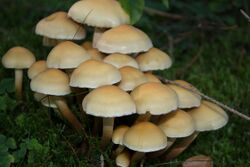Biology:Hypholoma capnoides
| Hypholoma capnoides | |
|---|---|

| |
| Scientific classification | |
| Domain: | Eukaryota |
| Kingdom: | Fungi |
| Division: | Basidiomycota |
| Class: | Agaricomycetes |
| Order: | Agaricales |
| Family: | Strophariaceae |
| Genus: | Hypholoma |
| Species: | H. capnoides
|
| Binomial name | |
| Hypholoma capnoides (Fr.) P.Kumm. (1871)
| |
| Synonyms | |
| |
| Hypholoma capnoides | |
|---|---|
| Mycological characteristics | |
| gills on hymenium | |
| cap is convex | |
| hymenium is adnate | |
| stipe has a ring | |
| spore print is brown | |
| ecology is saprotrophic | |
| edibility: not recommended | |
Hypholoma capnoides[1] is a mushroom in the family Strophariaceae. Found in both the Old and New World, it grows on decaying wood and is edible, though may resemble some poisonous species.
Description
- Cap: Up to 6 centimetres (2 1⁄2 inches) in diameter with yellow-to-orange-brownish or matt yellow colour, sometimes viscid.[2]
- Gills: Initially pale orangish-yellow, pale grey when mature, later darker purple/brown.
- Spore powder: Dark burgundy/brown.
- Stipe: Yellowish, somewhat rust-brown below.
- Taste: Mild (other Hypholomas mostly have a bitter taste).[3]
Similar species
The poisonous sulphur tuft is more common in many areas. H. capnoides has greyish gills due to the dark color of its spores, whereas sulphur tuft has greenish gills. It could also perhaps be confused with the deadly Galerina marginata or the good edible Kuehneromyces mutabilis.[3]
Distribution and habitat
Like its poisonous relative H. fasciculare ('sulphur tuft'), H. capnoides grows in clusters on decaying wood,[2] for example in tufts on old tree stumps, in North America, Europe, and Asia.[2]
Edibility
Though edible,[4] but could be confused with some poisonous species.
References
- ↑ Kummer P (1871) Führ. Pilzk. (Zwickau): 72.
- ↑ 2.0 2.1 2.2 Trudell, Steve; Ammirati, Joe (2009). Mushrooms of the Pacific Northwest. Timber Press Field Guides. Portland, OR: Timber Press. pp. 206. ISBN 978-0-88192-935-5. https://books.google.com/books?id=WevHvt6Tr8kC.
- ↑ 3.0 3.1 Gerhardt E (2006) BLV Handbuch Pilze. BLV, München. Seite 244. ISBN:3-8354-0053-3.
- ↑ Phillips, Roger (2010). Mushrooms and Other Fungi of North America. Buffalo, NY: Firefly Books. p. 216. ISBN 978-1-55407-651-2.
- Most content from up to March 2020 taken from the German page.
Wikidata ☰ Q1543695 entry
 |

